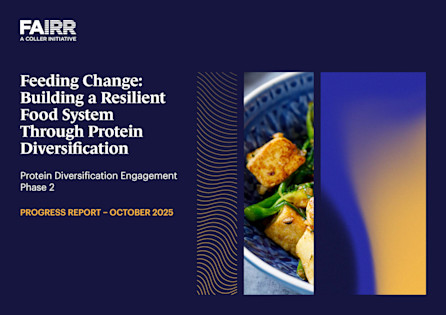Overview
The global food system is becoming increasingly vulnerable to supply chain disruptions driven by geopolitical conflicts, disease outbreaks, and more extreme and unpredictable weather patterns. Animal agriculture supply chains are particularly vulnerable to these risks.
Protein diversification offers companies with high exposure to animal proteins an opportunity to safeguard a supply of ingredients while also building a resilient product portfolio, amid uncertain macroeconomic events.
This report discusses the progress made by 20 of the largest food retailers and brand manufacturers in North America, Europe, and Australasia in leveraging protein diversification as a risk mitigation tool following the completion of Phase 2 (2024/25) of the FAIRR Protein Diversification engagement. This engagement was supported by 73 investors representing US$11.5 trillion in combined assets.
The findings of this report can help investors:
understand the vulnerability of the current food system, how animal agriculture is exposed to and contributes to these risks, and the opportunity for protein diversification to build business resilience;
learn how companies have progressed in leveraging protein diversification as a business opportunity in response to the material risks they are exposed to;
encourage their portfolio companies to harness the opportunity to diversify protein portfolios;
deepen their knowledge of market trends that are impacting the company's progress on protein diversification.
Key highlights
Key findings from this report:
Geopolitical developments have impacted how some companies publicly discuss their climate goals, but overall ambitions endure.
Despite 55% of companies setting SBTi targets, only 25% have quantified the emissions mitigation potential of their decarbonisation levers.
It remains unclear how most companies will incentivise progress towards their SBTi targets, as only 27% have linked Scope 3 emissions reductions to board remuneration.
Companies are approaching protein diversification as a business opportunity, but consumer demand is variable, and products do not always reflect their preferences.
More investment in innovation is needed to address ongoing product performance and long-term affordability challenges.
Companies are overlooking the transition risk of diet shift, focusing their supplier support on regenerative agriculture, with slow adoption of just transition strategies.
Despite at least 70% of companies identifying health and wellness as a significant material business issue, boards are not equipped to execute nutrition strategies.
Written by

Manager, Research & Engagements - Protein Diversification



